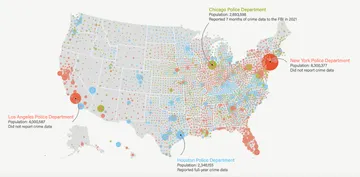Movie makers have long loved the story of the big city cop, gritty or flashy, corrupt or clean. So it wasn’t surprising to learn that this year’s Brooklyn Film Festival, a 10-day event that starts Friday, includes a 90-minute documentary centered on one.
But this story strays from the romantic or violent big-screen depictions. It’s called “The IF Project,” and as a synopsis explains, it’s about “a compassionate Seattle police officer,” a detective named Kim Bogucki, who creates a writing program with female inmates at the Washington Corrections Center for Women in Gig Harbor. Bogucki asks the prisoners to ponder the choices that led them to end up behind bars by posing the question: “If there was something someone could have said or done that would have changed the path that led you here, what would it have been?”
The documentary, directed by Kathlyn Horan, follows four inmates over seven years, as the writing program evolves into Bogucki’s life-consuming job. In an interview with The Marshall Project, Bogucki explained that the original idea has turned into a much broader effort.
In addition to the more than 3,000 inmates who have participated in Bogucki’s program, the IF Project now pairs prisoners with mentors who guide them through their first year of reentry after prison. A dozen prisons and juvenile facilities across Washington State currently host IF Project volunteers. Bogucki is also planning to open a women’s reentry center in Seattle with the proceeds of a 2015 Justice Department grant worth nearly $1 million.
Why do spend so much of your time working with inmates?
I think being on the police department for 28 years, I've done a lot of arresting and have written a lot of tickets. But about 15 or 16 years ago, I started doing outreach work, mostly with the younger homeless population in Seattle, trying to figure out why kids were making the choices that they were making. And it’s then that I realized, that I didn’t know a whole lot about some of the populations that were really marginalized which I was serving.
I was then contacted by a program called Girl Scouts Beyond Bars who work with a group of girls whose mothers were locked up. I agreed to help because we know that kids of incarcerated parents potentially can end up following in their footsteps to prison. I met with the mothers in prison. They started sharing their stories, and somewhere in that conversation, I realized obviously something hadn't worked for them. Randomly, I thought of the “if” question — “If there was something somebody could have said, or done to change the path that led you here, what would it have been?” That day none had any answers.
One of the inmates, her name is Renata Abramson, unbeknownst to me at that time, started thinking about that question. And it had to do with her hatred of the police. She started asking the inmates to answer that question and write it down. So this is how it's organically unfolded. Then one day, when I came back to the Washington Correction Center for Women for the Girl Scout Beyond Bars sleepover, Renata handed me a stack of papers that were the first answers to the “if” question, and that’s how the IF Project started.
I started reading the answers and I was blown away, because the amount of insight and knowledge and information that were in those answers from the women that were locked up. It was a plethora of knowledge that I had never even thought of. Why not use the stories? Not in a Scared Straight way, but to get those stories out to kids and try to prevent them from making bad choices. I always say the magic is when the former inmate shares their story from a heartfelt honest place.
So back to your initial question, I spend a lot of time with felons because they are people too, like them we all have stories.
What can cops learn from spending time with inmates and recently released felons?
You would be hard pressed to find a police officer that at some point in their career doesn't look in the back of their car and wonder what happened to the person that's in the backseat. This project gives that officer some answers and maybe changes the way they look at doing police work.
The bottom line is everybody, even people that we arrest, are still human beings. Mental health and chemical dependence are two big reasons behind many arrests. We don’t do a good job in this country addressing these issues. Most people who are sent to prison and jail will be released at some point. The government doesn’t do a very good job preparing people for the outside world. It’s hard for a former inmate to get a place to live, or a job, after being released. I think all these challenges adds to the cycle of creating more victims, because people are going to do whatever it takes to survive, and this may mean reoffend. We are trying to prevent that.
It seems that your solution for repairing frayed police-community relations would be to enroll more cops as mentors for inmates and ex-offenders. Is mentoring that effective?
You have to understand in police work, it's day in and day out, seeing people at their worst — period. This project has shown folks in my profession that some people can actually change. We need to look at the person not as a felon, and try and figure out what we as police officers can do to keep people out of prison. Mentoring is effective, whether it’s traditional or random. Police are in a unique position to mentor on a daily basis and many do probably without realizing it.
Seems odd that someone who was recently released from prison would want to sign up to be mentored by a cop. Can you explain why some inmates are attracted to this program?
Not all the mentors are police officers. They run the gamut. Attorneys, retired teachers, we've had teachers, we've had therapists, we've had people that worked in nonprofits. Really it's all walks of life that just want to make a difference in somebody's life. When we ask inmates the “if” question, the number one answer has been no positive role model in their lives. So the mentoring program addresses that.
The mentor visits the person they are matched with once a month for one year prior to getting out, and they also email once a week. Everybody has a personal reentry plan before they hit the gate. It’s about what they need and how we can help them get the resources to help them out.
Those first three days are the worst for somebody who is getting out. I took somebody to Walmart. They had been down for seven years. She walked into Walmart and had a panic attack because there were like 75 toothpastes. Or the woman that couldn’t figure out how to get the bathroom faucets to work, because they were now hands-free.
You are going to Brooklyn on Sunday to watch your work on the big screen. How do you expect your life to change as the documentary makes the rounds of film festivals?
I'm hoping that as we get more national attention, that we'll actually be able to facilitate more dialogue with people about incarceration. To bring people to the table that have been locked up and include them in this, they have some of the best insight to this problem and solution. Even if it’s allowing people to start looking at inmates as human beings and not animals, that would be a great start. Kathlyn does a great job in the film capturing a part of incarceration and reentry that I have yet to see. We hope that by using the voices from the inside we can make changes on the outside.
This interview has been edited for length and clarity.

